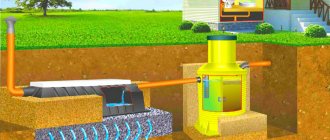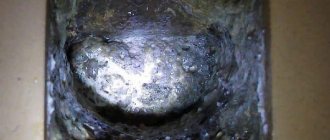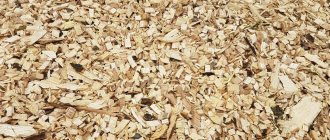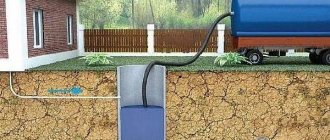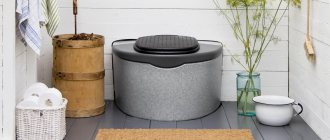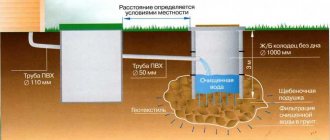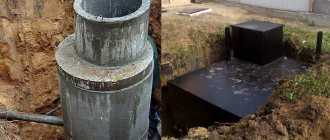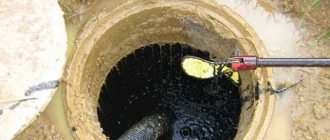Many of us have an autonomous sewage system in our dachas. Her heart is a cesspool dug right next to the house. Such a drive gets clogged quickly, it almost always smells bad, so sooner or later the problem of cleaning such a drive arises. If this circumstance is ignored, there is a risk of sewage entering the external environment. Along with them, pathogenic bacteria also break out. Until recently, the only way to clean was to call a sewer truck. A lot has changed today. Chemicals for cesspools are now on sale. It helps to simultaneously disinfect and dispose of wastewater, and combat any other problems with the operation of the autonomous sewage system and water supply system. A review of the best tools is the subject of this article.
Liquid concentrate for chemical cleaning of cesspools
How does the modern one work?
Chemical cleaning preparations for cesspools are capable of decomposing not only human waste, but also detergents dissolved in wastewater. Household chemicals can reduce to zero the impact of a biological preparation for a cesspool, but the chemical reagent will not stop working in it. However, it does not smell as strong as chlorine compounds.
Chemicals for cesspools are products that are used to clean septic tanks and cesspools; unlike biological products, they are not exposed to household chemicals, but are environmentally harmful to the integrity of the sewer system and the environment.
Until recently, formaldehyde was used for these purposes, but it was also banned. This substance is also called formicaldehyde. It can combat the growth of fungal microorganisms. Its alcohol solution, formalin, has long been used in medicine to treat the belongings of a patient with fungal diseases. Most often, shoes are treated with formalin, which otherwise could cause secondary infection with difficult-to-remove nail fungus. But for use in a cesspool, fighting only one fungus is not enough. After all, you also need to remove the smell and process the contents into fertilizer.
Important! Doctors have found that derivatives of formaldehyde should not be used again, because they are carcinogenic. The use of formalin on humans is prohibited today, and the reagent itself has been discontinued. This is another reason why you should switch to other septic tank treatments.
These are substances from inorganic chemistry. These include ammonium salts, as well as nitrate oxidizing agents. Gardeners know these reagents as fertilizers.
Nitrate oxidizers do a good job of processing detergent residues. Ammonium compounds process them somewhat worse. It has not yet been fully clarified whether the products of processing fecal matter with ammonium preparations are toxic. This means that they must be used with caution. If you put these reagents into a septic tank or cesspool, it is better to then call a sewer to dispose of the waste rather than use them for compost.
Nitrate oxidizers are well suited for recycling in detergents. However, the reaction produces the very nitrates that have been recognized as a harmful component of fertilizers. They can accumulate in some grains and vegetables. That’s why it’s worth considering whether it’s worth composting the recycled product or using the services of a vacuum cleaner.
You can fertilize with nitrate compost what you will not use for food:
- lawn grass;
- shrub for green hedge;
- flower beds;
- rock gardens.
For these plants, the contents of the cesspool treated with nitrate compounds are absolutely safe, especially when used in compost. All ornamental vegetation can be fertilized with the resulting compost, and this will give excellent results.
Another argument can be made in favor of chemicals: they begin to work faster than microorganisms. Any bacteria survives the so-called incubation period, whether an infection picked up by a person or a biological product poured into a cesspool. This is due to the fact that the microflora must multiply and form colonies, and this will take time. The chemical is immediately ready for use as soon as it is poured into the sump. The time of its exposure is determined by the period of the chemical reaction, and it is much shorter than the incubation period of bacteria.
Review of the best brands and brands
The most popular brands are:
- Bioactivator "Green Pine". Contains pine fragrance, which helps get rid of unpleasant odors and fights flies.
- Bioactivator "Sanex". The product is produced in the form of a powder, dissolved in warm water. It copes not only with organic impurities, but also with paper, starches, and various fats.
- "Doctor Robik." This is a biological product that contains about 100 species of bacteria. Decomposes phenols, fats, detergents, organic waste.
- "Bioforce". Contains a bacterial complex and special enzymes. The product effectively breaks down organic waste and eliminates unpleasant odors.
There are other drugs, for example “Biofarit”, “Atmosbio”, etc. The choice of the appropriate product depends on the environmental conditions.
What sewerage elements are chemicals compatible with?
As a rule, the use of chemicals for cesspools is justified where detergents are used. That is, it is a cesspool that serves the sewage system in the house, and not just a separate toilet. This means that both soap and household chemicals get into it. When using biological products, it would be necessary to limit the use of aggressive detergents. Chemical additives for cesspools and septic tanks are not afraid of household wastewater.
Chemicals perfectly clean drains of accumulated soap and fat residues, but at the same time provoke corrosive destruction of pipes and metal parts.
While biological drugs can be freely poured down the toilet and flushed down the local sewer to be sent to a septic tank, there are restrictions on chemicals. On the one hand, chemical additives allow you to use any detergent. On the other hand, the metal parts of the sewer system will not be slow to react to the presence of aggressive chemicals. Most likely, these elements will undergo corrosion, and then depressurization is not far away. You also need to know what material the various gaskets and seals are made of, because some of them may be damaged by the chemical.
If the sewer system is made of cast iron pipes, then this is not a death sentence: chemical additives can simply be poured into the pit itself through the hatch. And since they do an excellent job with fat deposits, but are unsafe for cast iron pipes, you can use other grease solvents inside the house, as long as they do not damage the reagents that you have working in the storage tank. If metal components are used in the septic tank, then this is already a “sentence” for the use of chemicals.
How to choose a drug
To choose a product, you need to decide on the appropriate composition, the type of bacteria in it, and the decomposition time of the waste.
When making a choice, rely on the following rules:
1.types of bacteria. The purpose of the drug influences the choice of composition. Some microorganisms do not decompose fecal sewage, which contains many harmful substances. The instructions indicate the specifics of using the product.
2.the number of bacteria in the product. The rate of waste processing is influenced by the number of bacteria, and their content also determines the frequency of use of the drug.
3.volume of the toilet. To determine the amount of product needed, you need to know the volume of the cesspool. A small number of microorganisms will not be able to organize a colony and will die. If there are too many of them, the bacteria will eat themselves.
4.volume of dry residue. As a result of the activity of bacteria, dry matter is formed. The lower its indicator, the higher the level of effectiveness of the drug. The dry residue value is indicated in the instructions.
5. service life. The closer the expiration date is, the lower its effectiveness. A product that has expired should not be used.
If the drug is poured into the septic tank for the first time, it is better to use a starting agent that will populate the pit with the first bacteria, thereby preparing the ground for waste processing.
How to get rid of chemically processed sewage products
Already processed products, where the chemistry loses its activity, can be sent to a compost pit, where they are subjected to biological effects. If in its pure form you pour what has been processed using chemicals in a cesspool onto the ground, this does not guarantee you against the spread of infection. Finally, beneficial bacteria must cope with it. It is known that the growth of one colony of microorganisms can suppress the development of other colonies. In this case, harmful bacteria should be suppressed by beneficial ones. This process is called bioheating of compost. After rotting in a compost pit, the waste will no longer be dangerous and can serve as a complete fertilizer for the soil. That is, no matter how effective the chemistry is, it does not eliminate the problems of subsequent disposal.
Sewage treated with chemicals, even in purified form, is unacceptable for further domestic use, so it is better to hire a sewage service to pump it out.
If for some reason you cannot provide the same bioheating, it is better to refuse to dispose of waste yourself and entrust this to specialists - vacuum cleaners. If you are ready to use further processing of the resulting slurry in a compost pit, then you will need a special fecal pump for this. It will save you from hard manual labor, and not the most pleasant one at that.
Sump pumps
To pump out fecal matter - processed or not, you need a special pump that could not become clogged from such work. After chemical treatment, the contents of the cesspool are liquefied, so it is easier for the pump to work with the resulting substance. Consequently, the requirement for such technology can be relaxed. It is not at all necessary that there be a powerful grinder at the pump inlet, because the mass will be prepared for pumping. If you need to pump unprocessed masses, then it is better not to undertake such work without a grinder.
By type, such pumps are submersible, surface, and there is also an intermediate type - semi-submersible. If we are talking about transferring contents from a cesspool to a compost bin, then you can use a household version of a pump. You'll likely need an above-ground model with long hoses because compost pits are often far removed from cesspools for sanitary reasons.
When the pump needs to be used constantly, it is better to choose a stationary option, including a submersible or semi-submersible type. There is also such a variety as a drainage pump. It is used when there is dense waste in the wastewater. When treating wastewater with chemicals, the use of such a device is not necessary, but if you have one on your farm, then there are no obstacles to using it.
Pumps are often used in private homes to clean wells and sewer pits. They come in several types: drainage and drainage-fecal, respectively, they are designed for slightly different purposes and have different capabilities.
Sewage pump prices vary, but that's no reason to buy either the most expensive type or the cheapest. You need to study the instructions and understand whether the equipment is suitable for your case of transferring waste into a compost pit from a cesspool.
The result of using special means
As a result of the use of drugs, not only fecal matter is processed, but also harmful substances and organisms that release sewage are killed.
Fecal matter, paper, various acids, as well as detergent foam, starch or fats decompose. The drugs cope:
1.with the development of harmful microorganisms.
2.with the release of toxic vapors.
3.with the destruction of the dry closet.
4.with the formation of deposits from feces inside sewer pipes, they also combat blockages.
5. with the appearance of unpleasant odors.
6.with the appearance of allergies in people.
Attention! Basically, all preparations process feces into liquid, with which you can water your garden, wash your car, or simply pour it into the ground.
The drugs liquefy fossilized waste at the bottom of the pit and kill harmful substances in it.
Active bacteria kill poisonous gases that are harmful to humans, because pathogenic microorganisms that cause such odors are killed.
What experts say about chemicals for cesspools and pumps
If you have treated the wastewater with chemicals, it will be easy to pump it out. However, I would not recommend using any pump while vigorous chemical processes are taking place in the pit. This may damage your equipment. If you start pumping all this into the compost pit before the waste has been processed, you will ruin the future fertilizer. It is necessary for the processing process to be completed, and then you can begin using biological methods to obtain fertilizer for the next season.
Electrician, experienced summer resident,
Konstantin Braychun.
Still, new reagents for wastewater are a big step towards ecology compared to bleach, after which little grows on the earth. Nitrate fertilizers have been known for a long time, and I would choose products based on oxidizing agents of this group. If you do not dump the waste processed by them under vegetable crops, you can find excellent use for it. I fertilize the flower beds and lawns on my site with a product obtained after exposure of the contents of the cesspool to chemicals and I believe that this is safer than burying unprocessed fecal matter in the beds, say, with currants. After chemicals, there is, although not a 100% guarantee, but a partial, that the area will not be contaminated.
Chemist,
Lydia Smirnova.
Let it be argued that the processing of fecal matter using chemicals is insufficient, but the remainder can be safely entrusted to nature. Either use the treated effluent to water the compost pit, or bury it in the ground. Soil bacteria will complete the processing of wastewater, so you have nothing to fear from infection. Just as humus is produced in the soil, water will undergo the same processes. Solutions of nitrate oxidizers are the best option among existing chemical preparations.
Biochemist,
Sergey Borisoglebsky
